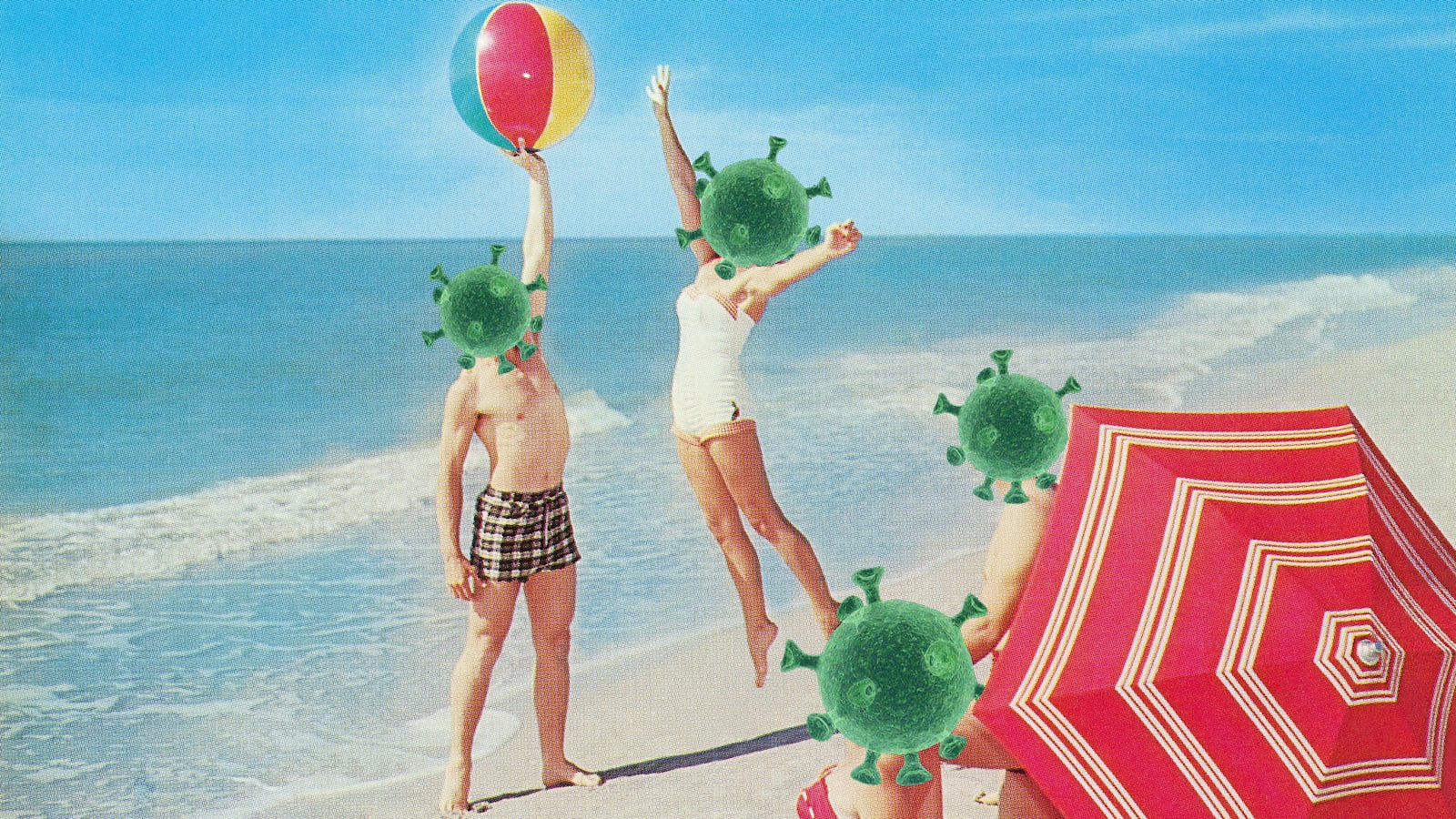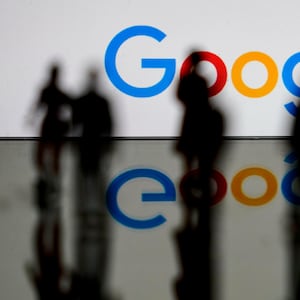MIAMI BEACH, Florida—On a hot sandy dune near 10th Street and Ocean Drive, three college-age men survey a group of young women in thong bikinis taking pictures in front of a beach chair storage shed. A 21-year-old student at Clarke Atlanta University in Georgia, Jonathan Edwards is clad in a white T-shirt, black swimming trunks, and a baseball cap. He puffs on a joint and leans into his 22-year-old friend, who only gives his name as “Bobby Don.”
“I’m telling you the beach is about to get live bro,” Edwards says.
It’s mid-afternoon, peak sunbathing time for hordes of Spring Breakers vacationing in Miami Beach and Miami who, thanks to an historic national disease outbreak, don’t know when they may be heading back to campus. The 2019 coronavirus pandemic has forced colleges and universities across the country to shut down person-to-person contact, and shift to online classes to avoid community spreading.
Edwards, “Don,” and their friend Marvin Ganley arrived in Miami Wednesday evening, around the same time President Donald Trump announced he was enacting a travel ban on 26 European countries and the NBA shut down its season. Locally, Miami-Dade County officials canceled major draws such as the Youth Fair, the Miami Open, and all events at American Airlines Arena one week after the City of Miami called off Ultra Music Festival and Calle Ocho Music Festival. Meanwhile, Miami-Dade Mayor Carlos Gimenez and Miami Mayor Francis Suarez joined a procession of local, state, and federal elected officials who were self-isolating after coming into contact with a person who had the coronavirus.
On Friday, the Miami Herald reported Suarez tested positive four days after meeting with Brazilian President Jair Bolsonaro and some of his staffers, one of whom had contracted the coronavirus.
But with the world seemingly coming to a jarring halt all around them, Edwards, Don, and Ganley aren't going to let the pandemic turn their Spring Break into a buzzkill. The mission remains the same: party hard, and hook up with girls. And with their school extending Spring Break by another week, they are also contemplating the next locale to keep the party raging—even as experts sounded the alarm about the young exposing the more vulnerable.
“Hell yeah, we’re trying to get in them yams,” Edwards says. “I’m hooking up.”
Adds Ganley: “I’m on everything. I’m a slut.”
Although all three say they would not kiss anyone on the mouth, they aren’t holding back from the idea of (protected) sex with other college kids. “I’m going to tell them I got corona so we can’t do the mouth-to-mouth,” Don says sarcastically.
Jokes aside, those precautions may repel sexually transmitted diseases, but more than likely prove ineffective at preventing coronavirus infections, which are generally thought to be spread through respiratory droplets and person-to-person contact, according to the Centers for Disease Control and Prevention (CDC). It’s also possible a person can get the coronavirus by touching a surface or object that has the virus on it and then touching their own mouth, nose, or possibly their eyes, though this is rarer.
Arnold Monto, a University of Michigan epidemiology and global health professor, said since many Spring Breakers won’t have campuses to return to, they could end up staying in places where they are gathering in large packs. That is not good. “The issue is that they shouldn’t be congregating in large numbers,” Monto said. “I suspect [officials] in Florida are going to restrict this kind of activity in terms of the places they would ordinarily go as the outbreak continues.”
Still, even as the pandemic worsened in the U.S., thousands of spring breakers descended on Miami and Miami Beach in recent days. Many boarded Caribbean cruises, petri dishes for mass virus infections, that were slated to return on Friday. Their peers who remained behind in the Magic City have been frequenting bars, nightclubs and tourist traps. In the next few days, some of these college students who may have been exposed to the coronavirus will be returning to their home states, where they could infect older relatives who may be more susceptible to serious illness.
“If they pick it up there and they do go home, they will be spreading it,” Monto said. “At that age, you believe you’re not vulnerable to anything. They need to be reminded about the potential harm to their families, their grandparents especially.”
Monto said the potential harm crystallizes why there’s a “desperate need” for more extensive coronavirus testing in the U.S.
On Wednesday evening, regular haunts in the trendy neighborhood of Wynwood were packed with vacationing college-age people from various corners of the U.S. At Wood Tavern, Racket, and the Dirty Rabbit, Spring Breakers grinded on each other and shared blunts on the dance floors. (The scene was altered in Coyo Taco’s backroom bar, the site of weekly reggae party engulfed in cannabis smoke—the evening’s emcee relayed the following public service announcement: “Everybody gotta smoke their own spliffs. No passing around tonight.”)
At Wynwood Walls, an outdoor art mural park, University of Pennsylvania seniors Chloe Dietz and Michelle Cai said they cancelled a trip to Paris and Amsterdam amid concerns they would not be able to come back to the U.S. Instead, the two friends decided to come to Miami, which turned out to be the go-to city for other Spring Breakers from UPenn who altered their travel plans, Dietz said.
“I feel like being young and healthy, I won’t be affected,” Dietz said. “It’s more like the spread of it and how quickly it is spreading. I think it’s good that everything is being cancelled.”
A 22-year-old from Boca Raton, Dietz added that she brings hand sanitizer wipes everywhere she goes now. Cai, a 21-year-old from Westchester, New York, said college students on Spring Break probably are not even aware that hooking up could facilitate the spreading of the virus.
“They’re not thinking about that,” she said. “It’s not like anyone is warning them not to. We are in a sorority and they told us not to share drinks and stuff like that.”
Still, it appeared local government officials were pulling the plug on spring break as the pandemic hit Miami-Dade by late this week. The Florida Department of Health reported the first confirmed case of the coronavirus in Florida’s most populous county on March 11. Another case was confirmed the following day. Both were considered travel-related.
At a Thursday afternoon press conference, Miami Beach Mayor Dan Gelber announced the city was under a state of emergency, which gave officials special powers to close private clubs and enact curfews. (As of press time, Miami Beach had not taken those drastic measures, and beaches remained open to the public.)
Gelber said the city was also suspending special event permits for large gatherings of more than 250 people for the next 30 days. Workers were to begin dismantling a fenced off area for a city-sponsored Spring Break event called Myami Beach, according to the Herald.
“To the extent that anybody can declare Spring Break is over, it is over this year,” Gelber said. “We are the point of an economic engine, and it’s incumbent on us to make sure that we lead the way in this effort.”
On the sand near 10th Street, Edwards, Don and Manley already have a contingency plan.
“We’re about to go somewhere else because the flights are cheap as hell,” Don says. “We might go to Toronto. I don’t know.”







